|
|
|
Sort Order |
|
|
|
Items / Page
|
|
|
|
|
|
|
| Srl | Item |
| 1 |
ID:
078965
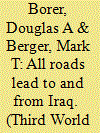

|
|
|
|
|
| Publication |
2007.
|
| Summary/Abstract |
This concluding article returns to some of the key themes of this volume in relation to insurgency, counter-insurgency and collapsing states. In particular it attempts to characterise the relationship between the Long War and the Cold War, in relation to the transformation of the nation-state system. More broadly it emphasises that the Cold War was an often misdirected, militarised struggle between 'genuinely existing' liberal capitalism and 'genuinely existing' state socialism (the First World and the Second World) against each other and for influence and power in the erstwhile Third World. The Long War, meanwhile, reflects both the triumph of 'genuinely existing' liberal capitalism as the dominant form of secular modernity over an equally, if not more virulently secular 'genuinely existing' state-socialism, and the emergence of an anti-secular neo-traditionalism (often, but not exclusively, Islamic) at both the nation-state and the transnational level. At the same time the binary that drove the Cold War and led to considerable bloodshed, was often characterised by contradictions within the two main ostensible challengers which were as potent as those between them. This is also the case in relation to Islamic revivalisms and their neo-traditional challenges to secular modernity and 'genuinely existing' liberal capitalism. (In fact, it is worth noting, that although Islamic fundamentalisms are at the forefront of the neo-traditional revival, there are other religious-based neo-traditionalisms seeking to counter the global spread of 'genuinely existing' liberal capitalism.) We conclude that the 'real' Long War may be a struggle within the 'Muslim world' rather than the ostensible struggle between the 'West' and 'Islam'
|
|
|
|
|
|
|
|
|
|
|
|
|
|
|
|
| 2 |
ID:
049243
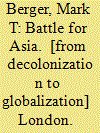

|
|
|
|
|
| Publication |
London, routledgeCurzon, 2004.
|
| Description |
xii, 343p.hbk
|
| Series |
Asia's Transformations
|
| Standard Number |
0415325293
|
|
|
|
|
|
|
|
|
|
|
|
Copies: C:1/I:0,R:0,Q:0
Circulation
| Accession# | Call# | Current Location | Status | Policy | Location |
| 047240 | 950/BER 047240 | Main | On Shelf | General | |
|
|
|
|
| 3 |
ID:
069167
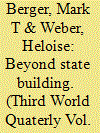

|
|
|
| 4 |
ID:
061091
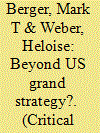

|
|
|
| 5 |
ID:
090162
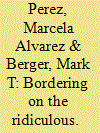

|
|
|
|
|
| Publication |
2009.
|
| Summary/Abstract |
This article examines contemporary concerns about citizenship, security, and development against the backdrop of an emergent "MexAmerica." It seeks to de-routinize the idea of the nation-state and de-naturalize the history of North America in order to move beyond the influential technocratic and quantitative approach to border security and development, and thus to define the current crisis manifested in practices of border security, citizenship, and economic integration.
|
|
|
|
|
|
|
|
|
|
|
|
|
|
|
|
| 6 |
ID:
080262
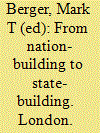

|
|
|
|
|
| Publication |
London, Routledge, 2008.
|
| Description |
ix, 211p.
|
| Standard Number |
9780415413787
|
|
|
|
|
|
|
|
|
|
|
|
Copies: C:1/I:0,R:0,Q:0
Circulation
| Accession# | Call# | Current Location | Status | Policy | Location |
| 053022 | 327.17/BER 053022 | Main | On Shelf | General | |
|
|
|
|
| 7 |
ID:
098848


|
|
|
|
|
| Publication |
2010.
|
| Summary/Abstract |
This article engages with the latest (post-Cold War) debate about the theory and practice of nation building (state building). This is linked to a discussion of the shift in US foreign policy towards Afghanistan relative to Iraq between late 2008 and late 2009. Afghanistan is currently a major focus of nation building efforts and counter-insurgency programs led by the United States of America. Meanwhile, the discussion here ranges from South Vietnam to Colombia, Iraq and Afghanistan, and explores some of the ghosts that now haunt the US presence in Afghanistan 9 years on from the start Operation Enduring Freedom at the end of 2001. We argue that the possibility of successful nation building in Afghanistan is both far-fetched and far-off. In fact, what is required is the reorientation and reduction (even termination) of Washington and its allies' direct commitment to Kabul. Washington and its allies should focus on a grand strategy for the Middle East and Asia that attaches far less importance to Afghanistan. This should occur in the context of understanding the history of the emergence, universalization and contemporary crisis of the nation-state system. Nowhere are the limits of the nation-state system and the failure of nation building more apparent today than in Afghanistan. In this context a whole new approach to questions of war, peace and progress is in order. The comprehensive elaboration of a new security-development framework is beyond the scope of this article, but we conclude by elaborating some of the main elements of a new framework: this will include a point of departure for research and policy to move beyond the current crisis of the nation-state system and nation building.
|
|
|
|
|
|
|
|
|
|
|
|
|
|
|
|
| 8 |
ID:
086398
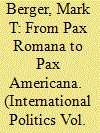

|
|
|
|
|
| Publication |
2009.
|
| Summary/Abstract |
This review paper focuses on the most recent cycle in the debate about the history and future of the 'New American Empire,' both in relation to the rise and fall of the Roman Empire specifically, and against the wider backdrop of the extensive debate about the US position in the changing global order more generally. It argues that much of the literature, including some of the books under review, rest on a misreading of history (Roman or otherwise) and a flawed grasp of the fate of the American ascendancy in relation to the contemporary crisis of the nation-state system and the far from unexpected boom-bust cycles of 'genuinely existing' liberal capitalism (globalization) in the twenty-first century. The washout on Wall Street in the latter part of 2008 could only come as a surprise to those who have not been paying attention to the vicissitudes of 'genuinely existing' liberal capitalism over the past 30 years or more. The paper argues that the American ascendancy, contrary to much of the contemporary prognostication, remains in its prime and Pax Americana will only begin a downward spiral when it has been successfully challenged and displace by an equally powerful and systemic alternative. In the meantime, the New American Empire, especially under new leadership, looks set to continue and even flourish.
|
|
|
|
|
|
|
|
|
|
|
|
|
|
|
|
| 9 |
ID:
099054
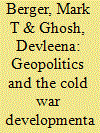

|
|
|
|
|
| Publication |
2010.
|
| Summary/Abstract |
Contrary to the view of some observers who insist that the Cold War was of limited or no relevance to the transition from colonies to nation-states after 1945 we argue that the geopolitics of the Cold War played a crucial role in shaping the character and direction of the trajectories of nation-states in Asia, if not the erstwhile Third World as a whole. More particularly, the geopolitics of the Cold War provided the crucial backdrop for the rise and fall of developmental nationalism, while the post-Cold War era has set the scene for an array of cultural nationalisms. These issues are explored with a particular focus on India. The case of India makes clear that it is impossible to separate the emergence of new nation-states and their success or failure after 1945 from the geopolitics of the Cold War. It will also make clear that the shifting geopolitics of the end of the Cold War reinforced the demise of developmental nationalism. Since the late 1980s, the problems facing the nation-states of the former Third World, are being played out in a geo-political context, which includes an important shift from developmental nationalisms to cultural nationalisms, while the nation-state system itself is sliding deeper into crisis against the backdrop of the global framework of 'genuinely existing' liberal capitalism and the changing geopolitics of the early twenty-first century.
|
|
|
|
|
|
|
|
|
|
|
|
|
|
|
|
| 10 |
ID:
001593
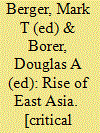

|
|
|
|
|
| Publication |
London, Routledge, 1997.
|
| Description |
xx, 308p.
|
| Standard Number |
0415161673
|
|
|
|
|
|
|
|
|
|
|
|
Copies: C:1/I:0,R:0,Q:0
Circulation
| Accession# | Call# | Current Location | Status | Policy | Location |
| 041187 | 320.95/BER 041187 | Main | On Shelf | General | |
|
|
|
|
| 11 |
ID:
085908
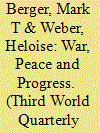

|
|
|
|
|
| Publication |
2009.
|
| Summary/Abstract |
The theory and practice of development has a complicated relationship to the history of war and peace in the 20th century. Efforts to realise the promise of progress have been played out against the backdrop of the crisis of colonialism, national liberation, decolonisation and the rise and fall of Third Worldism. Third Worldism, conceptualised as a specific project to realise the promises of progress, was also affected by the transformation and onset of the crisis of the nation-state system and the re-calibration of the development-security nexus in the post-Cold War era. The short history of the 'three worlds of development' appears now to have been overlaid by global development; that is, a process which entails intensified social and political network-relations, with accompanying regulatory efforts becoming more global in scope and reach. Yet, the most influential drivers and proponents of 'progress' continue to focus on the nation-state as the natural mechanism for the realisation of development, security and to some extent the protection of human rights. A critical reinterpretation, however, of the struggles engendered by this constellation suggests that they are better viewed as struggles for recognition (and redistribution) rather than driven by realising statehood per se. Concurrently, development as an internationally framed global project (underpinned by neoliberalism) has coexisted with alternative conceptions. Collectively, the latter hold out a range of paths-to-progress not-yet-taken at a systemic level, and flag the everyday struggles of denigrated multitudes. This special 30th anniversary issue brings together contributions that seek to revisit the dynamics and complexities of the history of war and peace in relation to the pursuit of progress. The issue as a whole foregrounds contemporary crises of violence and insecurity in relation to core organising principles of world politics; the nation state and the inter-state system and underlying assumptions to realise the promises of progress. That this project is beset with crises and contradictions is recognised by both its advocates and critics. However, there is no consensus on either causal dynamics or potential solutions, despite common acknowledgements of the complexities involved. The first part of this introduction broadly examines the 'crisis' of the state and brings to the fore the need to appreciate the dynamics of social and psychological aspects of these struggles. The second part focuses on the contours of the 'crisis' of global development.
|
|
|
|
|
|
|
|
|
|
|
|
|
|
|
|
|
|
|
|
|